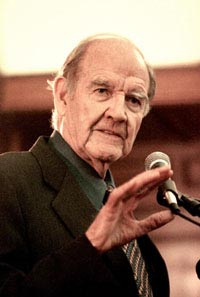|
HOME | SEARCH | ARCHIVE |
|
By Cathy Cockrell, Public Affairs
| |
|
07 February 2001 | Former U.S. Senator and presidential candidate George McGovern offered a prescription for alleviating world hunger, and anecdotes from his long career in politics, at a Jan. 30 lecture at the Richard and Rhoda Goldman School of Public Policy.
Currently the U.S. representative to the United Nations Agencies for Food and Agriculture in Rome, McGovern proposed a five-point program for alleviating world hunger - among them creating school lunch programs in developing nations.
In his warm and colloquial talk, broadcast on national and local public radio as a meeting of the Commonwealth Club of California, McGovern spoke of his career as a World War II bomber pilot; his early encounter with human hunger, in wartime Italy; and his relationships with and assessment of several presidents, particularly John F. Kennedy.
McGovern has detailed what he calls an "affordable and achievable" plan to reduce human hunger by half within the next 15 years - and to end it completely by the year 2030 - in his new book, "The Third Freedom: Ending Hunger in our Time."
Worldwide, he told the Goldman School audience, 300 million children of school age go hungry and 130 million of them, mostly girls, don't go to school.
His plan calls for school lunch programs, modeled on America's highly successful federal program, to be provided in poor nations. These, he said, would alleviate hunger, dramatically increase school attendance, performance and health, and help curb population growth. (Illiterate girls average six children each, while literate girls, worldwide, average 2.9 children, without abortions, he said.)
His other recommendations include supplemental feeding programs for pregnant women (modeled on the federal Women, Infants and Children program), and creating food reserves in strategic locations around the world, for rapid deployment during emergencies like the recent Indian earthquake.
Technical assistance, to "help other countries achieve sustainable development," is the most challenging part of his program, he said. A fifth, and controversial, proposal is to "apply scientific agriculture, including GMOs (genetically-modified crops) to the developing world.
"Scientific agriculture has been an enormous blessing to the world," McGovern asserted. "Carefully selecting the most promising GMOS, such as yellow rice," would help alleviate hunger in developing nations.
McGovern said that of all the presidents he worked with in the 44 years he has been involved in Democratic politics, it was John F. Kennedy, followed by Lyndon Johnson, who had the most concern for hunger in America.
McGovern recalled an incident during the 1960 election, when Kennedy was running for president and McGovern was making his first bid for the U.S. Senate. After Kennedy delivered a lackluster campaign speech to 70,000 farmers at the National Corn Picking Contest in Sioux Falls, S. D, the two traveled on to the Corn Palace in Mitchell, S.D., and Kennedy turned to McGovern for advice. "I just laid an egg at Sioux Falls," he said
The South Dakota native told Kennedy to "throw that speech away and walk out on stage without notes. "Say that farmers can do much for the cause of peace and justice," because food is peace for a hungry world. "Promise to name a food for peace director" to lead an effort to narrow the gap between abundance and starvation, he advised.
McGovern said that JFK did just that; a few months later, as president, he named McGovern (who had lost his Senate race) as director of the U.S. Food for Peace Program.
"I described
my own job for the president," McGovern quipped.
Home | Search | Archive | About | Contact | More News
Copyright 2001, The Regents of the University of California.
Produced and maintained by the Office of Public Affairs at UC Berkeley.
Comments? E-mail berkeleyan@pa.urel.berkeley.edu.
